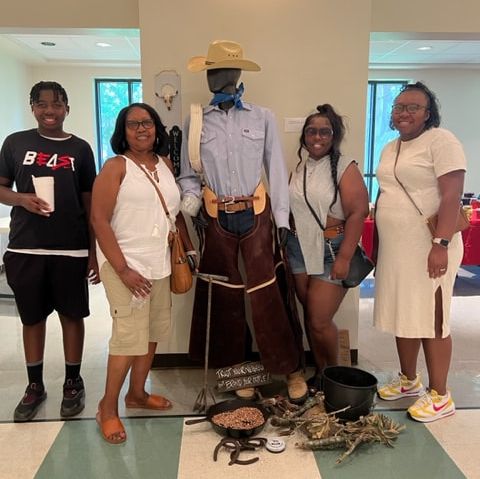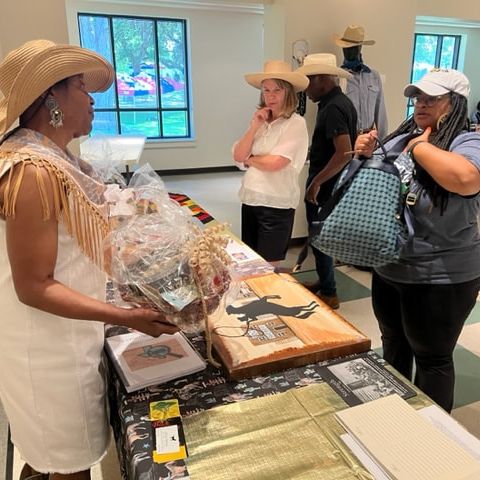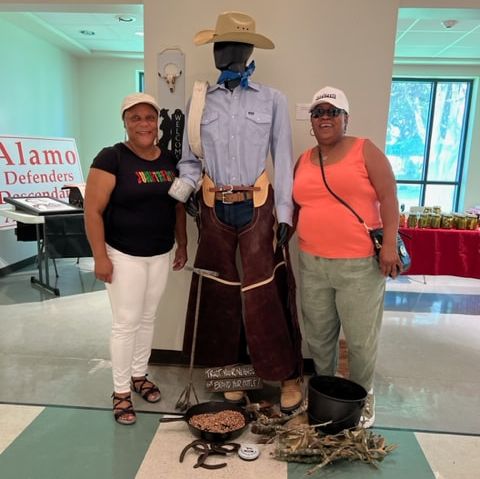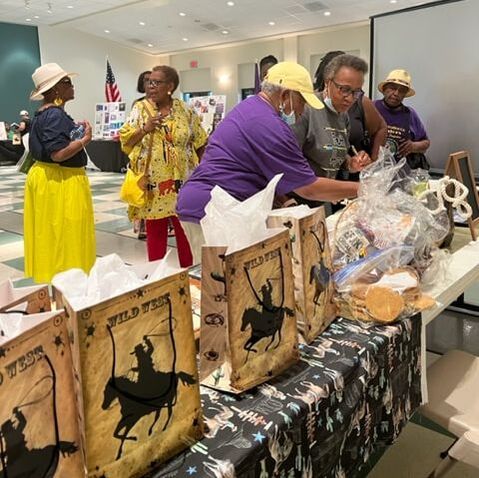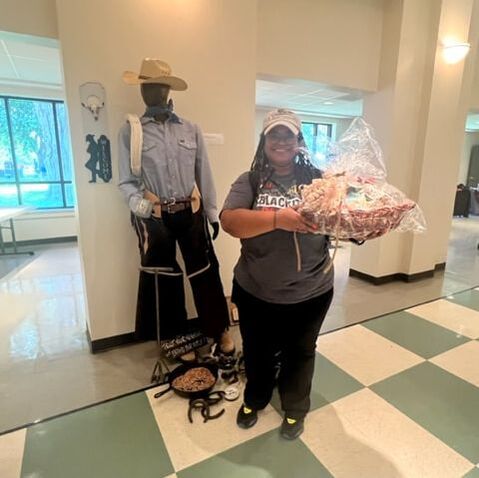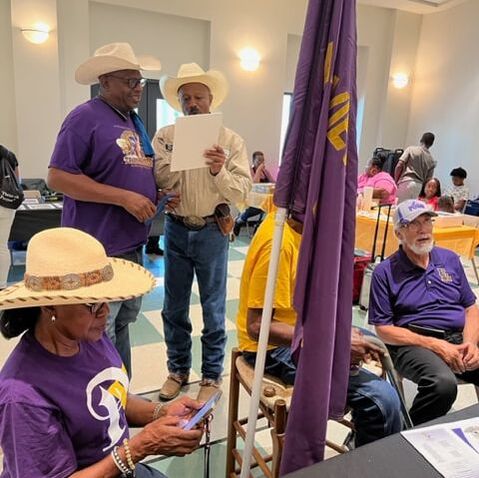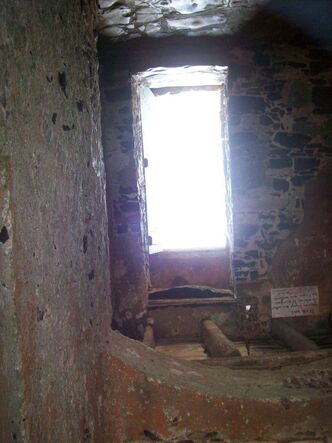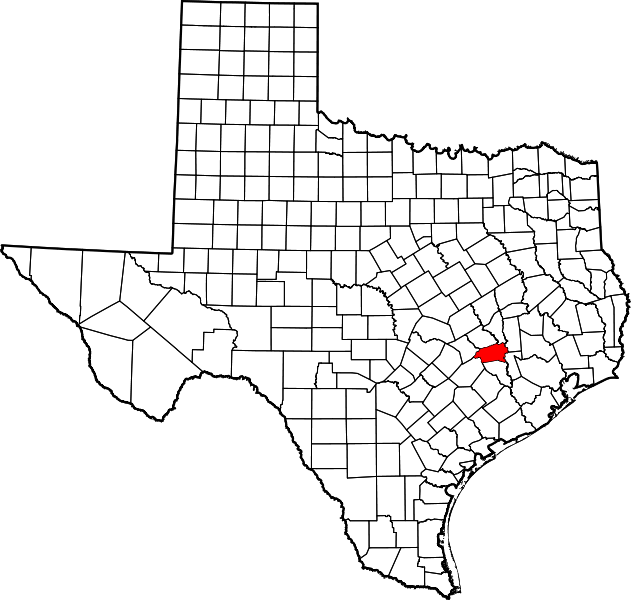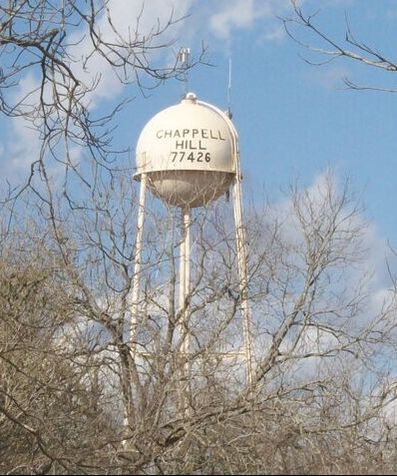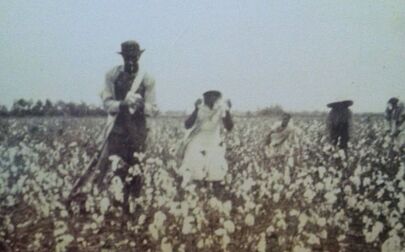What we dobring to life the powerful impact of our community's cultural and patriotic history through remarkable stories, events and jaw dropping exhibits while promoting the highest values of courage, honor and sacrifice as a heritage to treasure.
|
Why we do it to promote awareness of those who rose from the ashes of slavery and became inventors, military personnel, political, and sports contributors to our community, the county, the state and beyond.
|
WHO WE ARE...an all volunteer non-profit group made up of former residents of Chappell Hill (Washington County),Texas. We have proudly served this community since 2007, with annual Black History exhibitions, Middle School patriotic essay contests in conjunction with our Annual Memorial Day Observance and our most recent activity; The We Care project.
|
Juneteenth
During slavery, enslaved people were forbidden from owning drums, as they were used to communicate. New Oreans was the only city where enslaved people were allowed to gather each Sunday to trade, sing, and play music. This absence of drums contributed to the birth of jazz.
On January 1 1863,President Abraham Lincoln declared "that all persons held as slaves" within the rebellious states "are, and henceforward shall be free." The news reached Texas 2 years later in 1865 on June 19.
June is African American Music Appreciation Month! Created by former President Jimmy Carter in 1979, this month as African American musical influences that comprise an essential part of our nation's treasured cultural heritage.
From Black cowboys singing on the range to now in 2024, black music evolved and it became a major economic industry that changed and continues to change the livelihood of many in the whole world.
This evolved music gives listening audiences hope, encouragement, joy and entertainment. From Country Western folk songs to ragtime, to blues, jazz, rock n roll. From Country Western folk songs to ragtime, to blues, jazz, rock n roll, hip hop, rap and more; black music struck a major chord with audiences everywhere. This influence is seen early on across cultures, opening doors of prosperity for a once enslaved group of artists and creating a financial street of dreams.
A street paved with the birth of black recording studios and Radio stations that reached a larger and diverse audience. A street paved with musical awards, amazing concert deals and recording contracts, Television appearances, MTV videos and to sold out concerts.
.
From spirituals alerting others to the road of freedom, to the lonesome black cowboys singing on the range, to today's latest and greatest hits, the impact of black music changed history.
During slavery, enslaved people were forbidden from owning drums, as they were used to communicate. New Oreans was the only city where enslaved people were allowed to gather each Sunday to trade, sing, and play music. This absence of drums contributed to the birth of jazz.
On January 1 1863,President Abraham Lincoln declared "that all persons held as slaves" within the rebellious states "are, and henceforward shall be free." The news reached Texas 2 years later in 1865 on June 19.
June is African American Music Appreciation Month! Created by former President Jimmy Carter in 1979, this month as African American musical influences that comprise an essential part of our nation's treasured cultural heritage.
From Black cowboys singing on the range to now in 2024, black music evolved and it became a major economic industry that changed and continues to change the livelihood of many in the whole world.
This evolved music gives listening audiences hope, encouragement, joy and entertainment. From Country Western folk songs to ragtime, to blues, jazz, rock n roll. From Country Western folk songs to ragtime, to blues, jazz, rock n roll, hip hop, rap and more; black music struck a major chord with audiences everywhere. This influence is seen early on across cultures, opening doors of prosperity for a once enslaved group of artists and creating a financial street of dreams.
A street paved with the birth of black recording studios and Radio stations that reached a larger and diverse audience. A street paved with musical awards, amazing concert deals and recording contracts, Television appearances, MTV videos and to sold out concerts.
.
From spirituals alerting others to the road of freedom, to the lonesome black cowboys singing on the range, to today's latest and greatest hits, the impact of black music changed history.
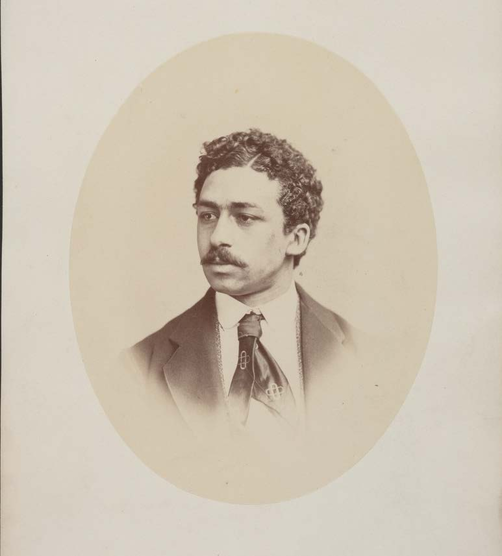
Black History Month
Monday January 15, is known as MLK Day, a day to honor the hopes, dreams and life changing legacy
of Rev. Dr.. Martin Luther King Jr
This is the only Federal Holiday designated as a National Day of Service to encourage all Americand to volunteer and improve their communities. - National Museum of African American History & Culture.- Smithianon
In Sports:
Douglas Lee Williams is the first Black quarterback to start and win a Super Bowl in 1988.
Douglas Lee Williams is an American football executive and former quarterback and coach. Williams is best known for his performance with the Washington Redskins in Super Bowl XXII against the Denver Broncos, making him the first black quarterback to both start and win a Super Bowl. Wikipedia
In Education:
Edward Bouchet was the New Haven High School (1866 to 1868) and graduated from Hopkins Grammar School (1870) as valedictorian of his class. Bouchet entered Yale College in 1870 and was the first African American to graduate Yale College in 1874. Library of Congress
Belle da Costa Greene, JP Morgan's First Librarian and Director. Ms. Greene (1879-1950) was one of the most prominent librarians in American History. She transformed an exclusive private collection into a major public resource, originating the robust program of exhibitions, lectures, publications, and research services that continues today. She was the daughter of Genevieve Ida Fleet Greene (1849-1941) and Richard T. Greener(1844-1922) pictured below. She grew up in the African American community of Washington D.C. with her African American parents, one brother and one sister.
Pictured above: Richard Theodore Greener (1844-1922), professor, lawyer, and diplomat, was the first Black man to graduate Harvard College, receiving an A.B. (Bachelor of Arts) degree from the College in 1870. -Harvard University Archives
In Music:
Count Bassie became the first Black man to win a Grammy, also taking home two awards, for best jazz group performance and best performance by a dance band.
President:
Barack Hussein Obama II (/bəˈrɑːk huːˈseɪn oʊˈbɑːmə/ bə-RAHK hoo-SAYN oh-BAH-mə; born August 4, 1961) is an American politician who served as the 44th president of the United States from 2009 to 2017. He was the first African-American president in U.S. history. Wikipedia.
As we celebrate Black History, it is important to remember that this above slice of North American History is interwoven with the complete American Story. Join us to celebrate, appreciate and explain.
|
Juneteenth Celebration Thanks all that supported and participated in this years Juneteenth Celebration. It was great to see the Prairie View Texas Riders Cowboy Association Visitors met slim. A symbol of strength and endurance Also we had Young romper's gift bags at the event Donate now to CHCHG to support our work in the community. |
On June 24, 2023, the Annual Judge Eddie E. Harrison Juneteenth Celebration was commemorated at the Washington-On-The Brazos State Historic Museum. The event took place under the banner of "Celebrating The Legacy of The Black Cowboy."
The Chappell Hill Cultural Heritage Group was honored to contribute to this historic exposition. Our contribution included a six-minute video that cast a spotlight on the often underappreciated narrative of the original "Cowboy." It showcased the resilience and fortitude of these individuals, their story representing a continuing legacy worthy of recognition. Using roping, branding, and cattle herding skills, many former slaves were able to drive thousands of cattle throughout Texas and beyond. The video highlighted figures who rose to fame, including Bill Picket and Nat Love, Charlie Sampson, Myrtis Dightman, and Bull riding World Champion who currently resides in East Texas.
Our indoor exhibits displayed a vast array of cowboy artifacts, providing a tangible connection to the past. Outdoors, an interactive roping experience offered engaging fun for all ages. Here, visitors learned the basics of roping, such as ideal spoke length, proper hand spacing, elbow positioning, and delivery techniques. This hands-on training was provided by Tweety McBride, Chappell Hill's own professional roper.
We would like to express our gratitude to our generous sponsors, who helped bring this Legacy Celebration to life. Our sincere thanks go out to H-E-B grocery, the IFS Department of Delta Airlines, the Melvin Benford family, Larry and Janice Crawford, the Zurcher family, David and Sonia O'Brien, Kevin and Lisa Payne, and Roy Benford & Associates.
We also extend special thanks to The Washington-On-The-Brazos State Museum for graciously hosting this significant event, serving as a fitting venue for the celebration of such an important aspect of our cultural heritage.
The Chappell Hill Cultural Heritage Group was honored to contribute to this historic exposition. Our contribution included a six-minute video that cast a spotlight on the often underappreciated narrative of the original "Cowboy." It showcased the resilience and fortitude of these individuals, their story representing a continuing legacy worthy of recognition. Using roping, branding, and cattle herding skills, many former slaves were able to drive thousands of cattle throughout Texas and beyond. The video highlighted figures who rose to fame, including Bill Picket and Nat Love, Charlie Sampson, Myrtis Dightman, and Bull riding World Champion who currently resides in East Texas.
Our indoor exhibits displayed a vast array of cowboy artifacts, providing a tangible connection to the past. Outdoors, an interactive roping experience offered engaging fun for all ages. Here, visitors learned the basics of roping, such as ideal spoke length, proper hand spacing, elbow positioning, and delivery techniques. This hands-on training was provided by Tweety McBride, Chappell Hill's own professional roper.
We would like to express our gratitude to our generous sponsors, who helped bring this Legacy Celebration to life. Our sincere thanks go out to H-E-B grocery, the IFS Department of Delta Airlines, the Melvin Benford family, Larry and Janice Crawford, the Zurcher family, David and Sonia O'Brien, Kevin and Lisa Payne, and Roy Benford & Associates.
We also extend special thanks to The Washington-On-The-Brazos State Museum for graciously hosting this significant event, serving as a fitting venue for the celebration of such an important aspect of our cultural heritage.
A Way Out of No Way
|
Hundreds of years ago the slave trade that bought and brought millions of men, women and children to North America by force and left West Africa did so through this singular narrow door. They stepped either into the ocean and drowned or onto a large cargo ship leaving behind everything familiar for an unknown land. |
The ‘...Way Out’ has a name; The Door of No Return.
|
There is a long heritage in Texas of African Americans who worked alongside many others to make the state what it is today. This exhibition is dedicated to all those who left a cultural heritage of perseverance in hardship while pursuing excellence for themselves, their communities and the nation. Thank you for your visit. © 2021 CHCHG, all rights reserved |
Martin Luther King Jr. Day
January 18, 2021
“Fat Jack’s”
Best barbeque in town
Mr. “Fat” (Willie Williams) was a business
Freedom: How American Blacks used it
On September 22, 1862, President Abraham Lincoln issued a preliminary Emancipation Proclamation declaring all slaves free in the rebellious states as of January 1863.
On November 19, 1863, President Abraham Lincoln formally issued the Emancipation proclamation calling on the Union army to liberate all slaves in states still in rebellion as “an act of justice, warranted by the Constitution, upon military necessity,” Three million slaves were declared to be “then, thenceforward, and forever free.”
Two and a half years later, on June 19, 1865, Union soldiers sailed into Galveston, Texas, announced the end of the Civil War, and read aloud a general order freeing the quarter-million slaves residing in the state of Texas. For more than two years slaves living in Texas were unaware of their liberation.
As a result of this news, black Americans began to celebrate their freedom with prayers, food, music, games and more.
This exhibit points to black owned businesses from two African Americans from Chappell Hill (Washington County) Texas, and the significance they made had on the community.
Willie Williams also known as “Mr. Fat” and “Fat Jack, and Finis R. Benford.
Mr. Fat attended Petersville elementary school, and later served his country through his military service in the United States Army. While there he was wounded. He suffered a major leg injury and was honorably discharged. He lived on Providence Street in a small “shotgun” style house, across from Miss Hadd’s fancy white house. He wore slacks with an apron and loved his work and his customers. Mr. Fat was loved and well respected.
After an honorable discharge from the military, he return home and started the first open air barbeque establishment in downtown Chappell Hill. In spite of his leg injury, every Saturday morning he walked from his home on Providence Street to his lucrative barbeque establishment. Mr. Williams (“Mr. Fat”) employed local youth. Their job was to chop wood and carry other essentials. He paid his employees $1.00 to have his wood chopped into precise measurements.
He paid them well mostly because he was so particular about his wood.
The wood needed to be divided into long and short logs, and needed to be perfect in order to control the heat and create the proper smoke flavor.
Customers would gather around and spend most of their week’s salary on his barbeque sandwiches with his famous homemade sauce. The sauce was kept in a corner on the pit so it never overcooked as it was out of direct heat. He used his handmade mop and provided samples to all who asked.
Mr. Fat served everyone; no one was ever refused. His meat sometimes sold out early in the day to travelers from state highway 290 before his regulars could buy anything. He had a great business and became known as offering the best barbeque in town.
Although Willie Williams (Mr. Fat) and the barbeque are no more and the pit itself has been closed down; the structure stands as a monument to the first black owned open air barbeque establishment in downtown Chappell Hill.
Freedom: How Local American Blacks used it
Finis R. Benford was born in Chappell Hill and attended Petersville Elementary School. After graduating from High School, he attended Prairie View College, and served as a medical intern for Dr. Franklin while there. Together they worked on research focusing on a cure for the cancer. While Finis owned his home and more than 100 acres of land, he also rented property from Robert Shear (the Chappell Hill banker) where he grew cotton and employed people to for work. (a picture example of Finis and his hired workers can be seen in the Chappell Hill museum in the economy room). Anyone needing a job could simply walk up ask for a job and they were hired.
Mr. Finis recognized how quite labor intensive cotton picking was. People worked long days under the super hot sun. Some pickers could pick 200 lbs a day while others picked much smaller amounts. And since it took about 1500 lbs to make a bale of seeded cotton; this method was not very productive. These 1,500 lbs would yield a mere 525 pounds of cotton once it was baled. Although there were many hired hand pickers working long hours using this method; only one bale per day was produced. Mr. Benford also recognized the burden of child labor and the lost opportunities for the town’s youth. Therefore, he decided to break this unhealthy practice and became the first owner of a John Deere Cotton picker in Washington County. This purchase not only relieved workers from the burden of the cotton sack, but provided between 4-5 bales of cotton per day instead of only one bale per day. The John Deere Cotton picker was used throughout Washington County, transforming the lives of many families.
Family time was restored to children including his own who could now attend school full time. This business allowed Mr. Benford the freedom to organize and train youth from the community to staff little league baseball and pony league teams. Kids were allowed to attend school daily and to participate in team sports that were fun yet taught valuables skills. These skills lead some to become professional well known sports figures.
There were many other things that Finis R. Benford did for the community, including teaching Sunday school, selling fertilizer, and helping rid fields of unwelcomed pest. Nevertheless, of all the outstanding contributions he made the most enduring impact was made improving the lives of the youth of Washington County, Texas.
Best barbeque in town
Mr. “Fat” (Willie Williams) was a business
Freedom: How American Blacks used it
On September 22, 1862, President Abraham Lincoln issued a preliminary Emancipation Proclamation declaring all slaves free in the rebellious states as of January 1863.
On November 19, 1863, President Abraham Lincoln formally issued the Emancipation proclamation calling on the Union army to liberate all slaves in states still in rebellion as “an act of justice, warranted by the Constitution, upon military necessity,” Three million slaves were declared to be “then, thenceforward, and forever free.”
Two and a half years later, on June 19, 1865, Union soldiers sailed into Galveston, Texas, announced the end of the Civil War, and read aloud a general order freeing the quarter-million slaves residing in the state of Texas. For more than two years slaves living in Texas were unaware of their liberation.
As a result of this news, black Americans began to celebrate their freedom with prayers, food, music, games and more.
This exhibit points to black owned businesses from two African Americans from Chappell Hill (Washington County) Texas, and the significance they made had on the community.
Willie Williams also known as “Mr. Fat” and “Fat Jack, and Finis R. Benford.
Mr. Fat attended Petersville elementary school, and later served his country through his military service in the United States Army. While there he was wounded. He suffered a major leg injury and was honorably discharged. He lived on Providence Street in a small “shotgun” style house, across from Miss Hadd’s fancy white house. He wore slacks with an apron and loved his work and his customers. Mr. Fat was loved and well respected.
After an honorable discharge from the military, he return home and started the first open air barbeque establishment in downtown Chappell Hill. In spite of his leg injury, every Saturday morning he walked from his home on Providence Street to his lucrative barbeque establishment. Mr. Williams (“Mr. Fat”) employed local youth. Their job was to chop wood and carry other essentials. He paid his employees $1.00 to have his wood chopped into precise measurements.
He paid them well mostly because he was so particular about his wood.
The wood needed to be divided into long and short logs, and needed to be perfect in order to control the heat and create the proper smoke flavor.
Customers would gather around and spend most of their week’s salary on his barbeque sandwiches with his famous homemade sauce. The sauce was kept in a corner on the pit so it never overcooked as it was out of direct heat. He used his handmade mop and provided samples to all who asked.
Mr. Fat served everyone; no one was ever refused. His meat sometimes sold out early in the day to travelers from state highway 290 before his regulars could buy anything. He had a great business and became known as offering the best barbeque in town.
Although Willie Williams (Mr. Fat) and the barbeque are no more and the pit itself has been closed down; the structure stands as a monument to the first black owned open air barbeque establishment in downtown Chappell Hill.
Freedom: How Local American Blacks used it
Finis R. Benford was born in Chappell Hill and attended Petersville Elementary School. After graduating from High School, he attended Prairie View College, and served as a medical intern for Dr. Franklin while there. Together they worked on research focusing on a cure for the cancer. While Finis owned his home and more than 100 acres of land, he also rented property from Robert Shear (the Chappell Hill banker) where he grew cotton and employed people to for work. (a picture example of Finis and his hired workers can be seen in the Chappell Hill museum in the economy room). Anyone needing a job could simply walk up ask for a job and they were hired.
Mr. Finis recognized how quite labor intensive cotton picking was. People worked long days under the super hot sun. Some pickers could pick 200 lbs a day while others picked much smaller amounts. And since it took about 1500 lbs to make a bale of seeded cotton; this method was not very productive. These 1,500 lbs would yield a mere 525 pounds of cotton once it was baled. Although there were many hired hand pickers working long hours using this method; only one bale per day was produced. Mr. Benford also recognized the burden of child labor and the lost opportunities for the town’s youth. Therefore, he decided to break this unhealthy practice and became the first owner of a John Deere Cotton picker in Washington County. This purchase not only relieved workers from the burden of the cotton sack, but provided between 4-5 bales of cotton per day instead of only one bale per day. The John Deere Cotton picker was used throughout Washington County, transforming the lives of many families.
Family time was restored to children including his own who could now attend school full time. This business allowed Mr. Benford the freedom to organize and train youth from the community to staff little league baseball and pony league teams. Kids were allowed to attend school daily and to participate in team sports that were fun yet taught valuables skills. These skills lead some to become professional well known sports figures.
There were many other things that Finis R. Benford did for the community, including teaching Sunday school, selling fertilizer, and helping rid fields of unwelcomed pest. Nevertheless, of all the outstanding contributions he made the most enduring impact was made improving the lives of the youth of Washington County, Texas.
Due to the covid-19 virus and its crowd size limitations this year, the Chappell Hill Cultural Heritage Group will not present its 2020 Memorial Day Tribute, “Local Heroes How They Inspire Me.”
Please visit http://www.chchg.org to read Jadlyn King’s account of how his grandfather, United States Army Serviceman, Jake Milam inspired him.
The CHCHG will resume its public Tribute in Chappell Hill, on Memorial Day 2021.
To all who served and gave their lives defending America, Thank you.
Please visit http://www.chchg.org to read Jadlyn King’s account of how his grandfather, United States Army Serviceman, Jake Milam inspired him.
The CHCHG will resume its public Tribute in Chappell Hill, on Memorial Day 2021.
To all who served and gave their lives defending America, Thank you.
The Cultural Heritage Group proudly participated in the 2018 Independence Day Parade with a patriotic banner.
Below are patriotic Trail Riders in the 2018 Independence Day Parade, Chappell Hill, Texas

